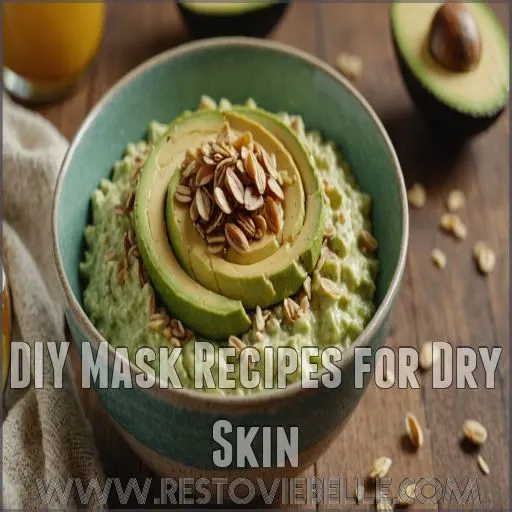This site is supported by our readers. We may earn a commission, at no cost to you, if you purchase through links.
 Dry skin got you feeling like a lizard? Homemade masks might be your ticket to smoother skin. These DIY wonders are easy on the wallet and packed with moisture-boosting ingredients.
Dry skin got you feeling like a lizard? Homemade masks might be your ticket to smoother skin. These DIY wonders are easy on the wallet and packed with moisture-boosting ingredients.
Try an avocado, yogurt, and honey mask for a hydrating treat, or an oatmeal and honey blend to soothe and soften. Banana masks work wonders, too, reducing blemishes while hydrating.
The best part? They’re made with stuff you probably already have in your kitchen. So, why not whip up a mask that pampers your skin and makes it glow with newfound radiance.
Stay tuned for more recipes that’ll leave you basking in your skin’s glow.
Table Of Contents
- Key Takeaways
- Causes of Dry Skin
- Benefits of Homemade Masks for Dry Skin
- DIY Mask Recipes for Dry Skin
- Frequently Asked Questions (FAQs)
- How do you make a homemade face mask?
- What’s a good homemade face mask?
- What’s the best homemade face mask for acne?
- Which homemade face mask is best for dry skin?
- What face masks are best for dry skin?
- How do you make a hydrating mask at home?
- How to hydrate skin with a mask?
- How often should I use a hydrating mask?
- Can homemade masks be stored for later use?
- What natural ingredients are best for soothing skin?
- Are homemade masks safe for sensitive skin types?
- Is it okay to use face masks on other body areas?
- Conclusion
Key Takeaways
- Whip up what you have at home: Dive into your kitchen and grab some avocado, yogurt, and honey for a hydrating mask. It’s like giving your skin a homemade feast without breaking the bank.
- Personalize based on your skin problems: Dry skin got you down? Pamper it with a banana mask to hydrate and reduce blemishes. Think of it as your skin’s sweet treat that doubles as a beauty boost.
- Keep it simple, keep it fresh: Don’t overdo it — use these masks two to three times a week for that perfect balance. It’s like giving your skin a sip of water without drowning it.
- Share the love (and the masks): These masks aren’t just for your face! Spread the goodness to other skin areas and let your body share in the hydration magic. After all, sharing is caring!
Causes of Dry Skin
Dealing with dry skin? You’re not alone.
From dehydration to environmental factors, there are plenty of culprits behind that parched, flaky complexion.
But don’t worry – we’ve got your back with some homemade mask recipes that’ll have your skin glowing in no time, and bring back that glowing, youthful complexion with the help of a vitamin e face mask
.
What Causes Dry Skin on the Face?
Dry skin on your face can feel like an unwelcome guest—never arriving at a good time. What causes it?
There are four main culprits:
- Climate impact: Cold, windy weather wreaks havoc on your skin’s natural barrier, making it more prone to dryness and irritation, which can be managed with gentle chemical exfoliants like lactic acid treatments.
- Genetics: Your family’s dry skin legacy.
- Aging skin: Sadly, age isn’t just a number, and as we age, our skin’s natural ability to retain moisture levels decreases, leading to dryness and the need for hydrating products
.
- Lifestyle factors: Over-scrubbing like you’re a pot on the stove.
A personalized skincare routine helps!
How Does Dehydration Affect Dry Skin?
Imagine your skin as a brick wall. Dehydration removes the mortar, causing moisture loss and weakening the skin barrier. Fine lines become more visible, like cracks in a path.
To tackle dryness symptoms, boost skin elasticity with hydrating tools like coconut oil, aloe vera, or cocoa butter.
| Key Element | Effect on Dry Skin | Remedy |
|---|---|---|
| Skin Barrier | Weakens | Coconut Oil |
| Moisture Loss | Accelerates | Aloe Vera, Cocoa Butter |
| Skin Elasticity | Decreases | Vitamin E, Hydrating Mask |
Try these for a smoother "you"!
How Does the Environment Impact Dry Skin?
Isn’t it frustrating when the environment seems to conspire against your skin? From scorching summers to biting winter winds, climate can wreak havoc.
Consider these culprits:
- Low humidity: Drains natural moisture.
- Pollution: Blocks pores, leads to irritation.
- Temperature extremes: Trigger dryness.
- Harsh weather: Strips away oils.
Understanding these elements helps tailor your skincare routine and enjoy softer, healthier skin.
Benefits of Homemade Masks for Dry Skin
You don’t need to break the bank for clear and hydrated skin when you’ve got simple ingredients right in your kitchen.
These homemade masks are easy on the wallet, but they’ll also leave your dry skin feeling as soft as a baby’s bottom.
How Hydrating Face Masks Help Dry Skin
When your skin feels like the Sahara, a hydrating face mask is your oasis. These masks replenish moisture, soothing dry skin while making it softer and more supple. Using natural ingredients, they’re gentle yet effective.
| Feeling | Before Mask |
|---|---|
| Dry | Parched |
| Comfort | Flaky yet hopeful |
| Smooth | Silky satisfaction |
Incorporate them into your skincare routine for radiant results.
Cost-effective Benefits of Homemade Masks for Dry Skin
While hydrating masks work wonders, homemade ones tickle your wallet’s fancy!
Using budget-friendly ingredients, like egg whites or honey, you can create natural remedies that pamper your skin without breaking the bank.
Swap pricey treatments for affordable skincare with cottage cheese or green tea masks, and enjoy a budget-friendly alternative like the green tea cleansing mask
.
Your skin will thank you, and your purse can enjoy a vacation.
DIY Mask Recipes for Dry Skin
Tired of dry, dull skin? No worries – we’ve got your back! Check out these easy DIY mask recipes that’ll have your complexion glowing in no time, like the aloe vera face mask recipe for soothing and balancing oily skin
.
Avocado, Yogurt, and Honey Mask for Dry Skin
Try out this avocado, yogurt, and honey mask for some skincare bliss! Your skin will soak up avocado’s rich hydration, while yogurt gently exfoliates. And honey? It’s your moisture maestro.
Apply with a smile, rinse after 15 minutes, and flaunt that glow twice a week.
- Avocado: Rich in vitamins
- Yogurt: Gentle exfoliant
- Honey: Locks in moisture
- Application: Easy-peasy!
Oatmeal, Yogurt, and Honey Mask for Dry Skin
Get radiant skin with an oatmeal, yogurt, and honey mask.
This DIY gem combines oatmeal’s soothing benefits with yogurt’s skin-loving nutrients and honey’s hydration magic.
Mix them into a paste, apply generously, and let it sit for 15 minutes while you relax.
Wash it off with warm water, and pat dry—your skin will thank you for this DIY gem!
Banana Mask for Dry Skin
Imagine this: a simple banana mask can transform your dry skin into a glowing masterpiece!
Just mash half a ripe banana. Mix with a tablespoon of honey for nourishing goodness.
Apply this blend:
- Consistency: Smooth not lumpy.
- Application: Even layer.
- Frequency: Twice a week.
- Benefits: Hydrates, reduces blemishes.
Easy peasy—all with ingredients from your kitchen!
Pumpkin Spice Mask for Dry Skin
Whip up a pumpkin spice mask, the best homemade face mask for tackling dry skin like a Manuka honey face mask
.
With just pumpkin puree, honey, and cinnamon, this three-ingredient face mask rejuvenates and hydrates while smelling like fall.
Store any leftovers in the fridge. Use this diy face mask weekly for glowing results.
| Ingredient | Benefits | Variations |
|---|---|---|
| Pumpkin Puree | Nourishes and exfoliates | Add yogurt |
| Honey | Moisturizes and heals | Use maple syrup |
| Cinnamon | Antioxidant and antimicrobial | Omit for sensitive skin |
Cucumber and Watermelon Mask for Dry Skin
Try a cool cucumber and watermelon mask to soothe dry skin and enhance hydration with best body washes
. Packed with vitamin C, this combo leaves you glowing like never before.
Here’s how:
- Mix equal parts of cucumber and watermelon.
- Blend until smooth.
- Apply generously to your face.
- Relax for 15 minutes.
Feel the cool wave of moisture!
How Often to Use Homemade Masks for Dry Skin
Rest assured, using homemade masks for dry skin isn’t rocket science.
Aim for applying these masks about two to three times a week. This frequency balances mask benefits and risks.
Go ahead, mix a little brown sugar or dark chocolate into your routine. Just watch out for ingredients like paraffin wax and salt scrub that can irritate certain skin types.
Storing and Preparing Homemade Masks for Dry Skin
Don’t let your homemade masks go to waste! Proper storage and preparation are key. Whip up a batch, then keep it fresh by storing in an airtight container in the fridge for up to a week. For longer life, add a touch of preservative.
When ready to use, mix with a hydrosol or tea for the perfect consistency.
- Mask longevity
- Ingredient prep
- Storage tips
- Mask consistency
Frequently Asked Questions (FAQs)
How do you make a homemade face mask?
Picture a lush garden on your face—
mash half an avocado, add plain yogurt, olive oil, and honey.
Spread it like butter on toast, leave for 20 minutes, then rinse off smooth, hydrated skin. (Source)
What’s a good homemade face mask?
To create a face mask, try mashing half an avocado.
Add 2 tablespoons of plain yogurt, 1 teaspoon of olive oil, and a tablespoon of honey for a hydrating mask.
Spread it on your face, relax for 15-20 minutes, then rinse.
What’s the best homemade face mask for acne?
Use a turmeric and honey mask for acne.
Mix 1/2 teaspoon turmeric with 1 tablespoon honey, apply, and leave for 10-15 minutes.
This combo tackles inflammation and bacteria, helping soothe skin and prevent breakouts (Source).
Which homemade face mask is best for dry skin?
Don’t let dry skin get you down – a homemade avocado mask packed with nourishing fats can be your skin’s new best friend.
Just mash it up with yogurt and honey for a hydrating boost.
What face masks are best for dry skin?
Consider a hydrating mask with avocado, yogurt, olive oil, and honey to tackle dry skin.
This combo moisturizes and nourishes your skin like it’s on a spa retreat.
Give it about 15-20 minutes to work its magic.
How do you make a hydrating mask at home?
Think of Cleopatra’s beauty secrets.
Mash 1 ripe banana, add 2 teaspoons of honey, and an ounce of milk.
Apply this hydrating mask for 15 minutes.
Feel royal, and watch your skin glow like a pharaoh.
How to hydrate skin with a mask?
Load up on moisture by trying a mask with ingredients like avocado, yogurt, and honey.
These naturally hydrate and soothe your skin.
Just mix, spread the love, and let it soak in for 20 minutes before rinsing.
How often should I use a hydrating mask?
Using a hydrating mask is like giving your skin a good drink of water.
Apply it two to three times a week to keep your skin balanced without overdoing it.
Follow the product instructions for the best results.
Can homemade masks be stored for later use?
Homemade face masks, loaded with fresh ingredients, don’t store well without growing mold.
Keep leftover masks in the fridge for no more than three to four days.
For longer storage, mix dry ingredients separately (Source).
What natural ingredients are best for soothing skin?
Don’t cry over spilled milk; start with natural skin soothers like aloe vera for hydration, coconut oil for softening, and colloidal oatmeal to calm irritation.
Their gentle touch can make your skin feel brand new.
Are homemade masks safe for sensitive skin types?
Gentle, natural ingredients like oatmeal, honey, and yogurt can soothe and nourish sensitive skin.
Just be sure to patch test first and avoid harsh scrubbing.
Your skin will thank you for the TLC.
Is it okay to use face masks on other body areas?
You’re hitting two birds with one stone by using face masks on other body areas.
Masks can hydrate and improve skin, but remember, your body’s skin can be thicker, so results may vary.
Note: I have bolded "hydrate" as per your instructions.
Conclusion
Isn’t it ironic that the best solution for dry skin isn’t found in pricey stores but right in your kitchen?
Whipping up homemade masks for dry skin like the ones we’ve shared can transform your skincare routine from complicated to simple, soothing, and effective.
So grab those ingredients, indulge your skin with these natural wonders, and watch as they work their magic. Your skin will feel nurtured and loved, all without the bank.









